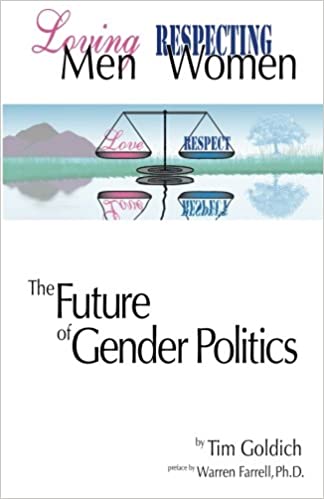Tim Goldich
Guest Writer

Author and speaker Tim Goldich offers his insight into gender politics and the power of the men’s circle in this exclusive article for the Legacy.
In a circle of men, men can share their pain with those who share their pain. When members of either sex gather together, they will tend to feel less inhibited, freer of the shaming influences that judgmental opposite sex usually holds.
Alone together, each sex may become more revealing and less competitive. With no women present, men direct their focus on other men … men brought together in the spirit of mutual support. Setting competition aside, a circle of men may be rendered emotionally safe, nurturing, encouraging, and compassionate. While women form a sisterhood, such men may become a brotherhood.
There are many techniques whereby a circle of men can be built into a safe “container” within which men may learn to trust other men and facilitate each other’s personal growth. This peer-to-peer facilitation can do wonders for men’s functionality out in the world. The container becomes a laboratory for testing attitudes and behaviors. Men become mirrors for each other and help other men to see and to own their human shadow (“that which we hide, repress, and deny”), identify their “triggers” (pre-existing emotional charges), and hold each other accountable.
The New Warriors, an organization of which I belong, teaches men how to build such containers. Since 2000 I’ve met with my brothers every Tuesday evening. Perhaps the single most important lesson we learn is to take responsibility for our lives. My men’s circle stresses accountability as a first principle. As “Warriors” we don’t take “excuses.” I’ll illustrate with an example.
If one of us is late to a meeting, that man is held accountable. If that man is new to Warriors and not yet familiar with its principles, the following dialogue may ensue:
“Why were you late?” he’s asked.
“Traffic was bad,” he says.
“No,” we say, “That’s what happened; why were you late?”
“I couldn’t find parking,” he says.
“Wrong again,” we tell him, “You know that traffic can be bad and you know that it can take time to find a place to park. Now, why were you late?”
This goes on until the man finally gets to his truth.
“The truth is I stopped on the way to the meeting to pick up some shirts from the cleaners. When I did that, I chose to make the completing of that errand a priority over giving myself enough time to ensure getting to the meeting on time regardless of ordinary traffic and parking delays.”
There – now we’re satisfied.
If the man was late because a bridge collapsed – an event outside his control and unpredictable – that would be different. But when a man makes controllable or predictable obstacles like “traffic” and “parking” responsible for the outcome he places the locus of control outside himself, when the truth is that his own choices are responsible for the outcome. Evading responsibility for his choices leads the man into disempowerment and victim mentality. In his own mind he becomes the “powerless” “victim” of “traffic” and “parking.”
This is just one simple example.
Like medicine, accountability tastes bad, but it’s good for you. Because it “tastes bad,” both women and men develop lazy habits that lead them to evade accountability. But we’re not inflicting accountability on a man to shame or blame him. We’re offering him what we call the gift of accountability—not for our benefit but rather for his. We know that the more a man holds himself responsible for his own choices and his own life, the more empowered he will be in his life.
So, when feminism convinces Woman to lay the blame for all that’s wrong in Woman’s world on Man, it places the locus of control outside Woman’s sphere and thus disempowers her. In this way, feminism denies Woman the gift of accountability. It leads Woman away from examining her own choices and leads instead to victim mentality. Hordes of angry, disempowered female “victims” may make for a driven and unified feminist constituency, but Woman herself is not all that well served by it.
Though at first accountability “tastes bad” to men as it does to women, as a group, men tend nevertheless to prioritize it. Becoming in effect an “acquired taste,” men often come to crave accountability. That Warriors – a men’s organization – stresses accountability above all else tells us something about Man’s innate priorities and proclivities (show me the women’s organization that prioritizes accountability). Likewise, that this same men’s organization adamantly, even dogmatically, rejects “victim” tells us something about why, when it comes to the politics of gender complaint, men are the silent sex.
Alright, so, allow me if you will to go deeper into gender politics here. I am of the opinion that a man’s personal work is not complete until he has seen through and shaken off the ever-growing misandry (the mirror-opposite of misogyny). I believe men must psychically shield themselves from the shaming anti-male prejudices of these feminist times. To be the best he can be, a man must come to know the other half of gender reality and in so doing, he must come to know that the condemnation of his sex is the product of a one-sided gender ideology, exaggerated and false.
The masculine impulse is to take Full Responsibility, but Man cannot take full responsibility in our world. Man has only half the power. Woman has the other half of the power and with it, she bears the other half of the responsibility (whether she’s held responsible or not). When Man takes Full Responsibility, not only is he being grandiose, he is also enabling Woman’s flight from accountability thus depriving her of the gift of accountability – and the personal empowerment that goes with it.
I believe that accountability and compassion go hand in hand. Accountability without compassion is ruthless. It is what we more often direct at men. It is respecting men but not loving them. Compassion without accountability is infantilizing. It is what we more often direct at women. It is loving women but not respecting them.
In the male ethos, “victim” is rejected. Essentially, but only where humans with penises are concerned, “victim” is dismissed as an illegitimate concept. But where does this instinctual impulse cross the line into becoming ruthless? Psychotherapist Aaron Kipnis observes, “Men are often more resistant to discussing victimization of any kind than women.”[i]
Men reject the truths of female power and their own experience of powerlessness (victimization) in relation to women. In many ways, this is an honorable stance that has served men well.
In the realm of gender politics, however, it has been disastrous. In the “game” of gender politics, “victim” is the “ball.” Woman, experiencing none of Man’s aversion to “victim,” grasps the “ball” with both hands and runs it up and down the field, scoring every point. Only women complaining creates the illusion that only women have anything to complain about.
Hence: In the realms of gender conflict and complaint, gender activism and advocacy, gender defining, gender issues, gender studies, gender politics, gender anything, there is feminism (“feminine-ism”) on the one hand and on the other hand there is … nothing. The “strong and silent” stance has sealed men and male perspectives out of gender politics (the politics of gender complaint).
There is a simple yet vital distinction to be made. On the one hand there is internalizing male victimization as a self-label or identity. This is the aspect of victim that men rightly shun. On the other hand there is coming to know the facts of male victimization and utilizing those facts as gender-political weaponry with which Man may stop playing the passive unconscious victim and start standing up for himself.
When feminists complain, they are telling the world that women are the victims (the only victims). In proclaiming themselves the victims, they take on victim status and demand that the world pour extra empathy upon them and take extra action on their behalf. If, however, when men complain they declare themselves “victims” in equal measure, this is not demanding extra empathy; this is demanding equal empathy, which is demanding justice. Men who demand justice are strong and worthy of respect. Men who do not demand justice are doormats. Ella Wheeler Wilcox: “To sin by silence when we should protest makes cowards out of men.” Indeed.
In summation, where this article is concerned, there are three points to made.
- First, a circle of men is a powerful thing that men can benefit from immensely.
- Second, a man cannot be all he can be so long as he remains indoctrinated to believe that his masculine essence—anything that would distinguish men from women—is basically “toxic.” To fully empower themselves, men must break the shackles of shame. Men must know and own, develop and work their masculine power. Otherwise, women will work their feminine weaponry while men render themselves unattractive and defenseless.
- And third, as is probably clear from your own emotional reaction to the above, the conundrum where this piece is concerned is this: can politicized male perspectives be entered into a circle of men without the circle polarizing, in-fighting, and breaking apart?
Perhaps feminist de-indoctrination is best worked through alone. I don’t know the answer to that. I know that, within a circle of men, politicized female perspectives can be spoken as simple truth telling to which all agree.
But I’m not certain that politicized male perspectives can safely be spoken within a circle of men.
But one thing I am sure – no matter the perspectives – having our own circle of men does empower us enough to deal with all covered above.
[i] Kipnis, Aaron, Angry Young Men: How Parents, Teachers, and Counselors Can Help “Bad Boys” Become Good Men (San Francisco, CA: Jossey-Bass, 1999) p.194.
Tim Goldich’s book “Loving Men, Respecting Women” can be purchased HERE


I am a long-time member of MDI and strongly resent this article being included in our organization’s publication without making it extremely clear that the author does not represent MDI. I find the author’s views on gender politics objectionable. I am not looking to shut down discourse and inquiry but do demand clarification that there is nothing in MDI’s credo that blames or criticizes feminism or women in any way. This piece does not belong here-period.